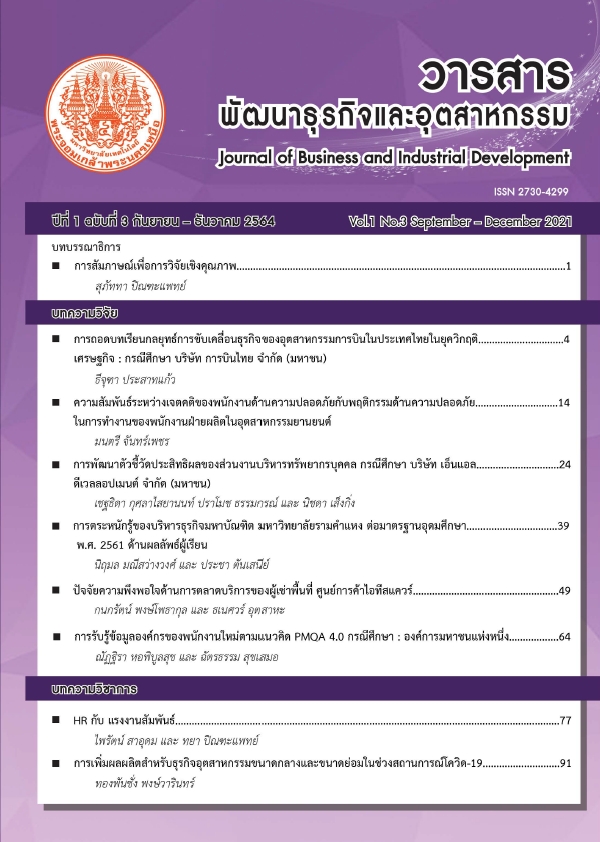HR กับ แรงงานสัมพันธ์
คำสำคัญ:
แรงงานสัมพันธ์, การบริหารทรัพยากรมนุษย์, องค์การบทคัดย่อ
การบริหารทรัพยากรมนุษย์ เป็นบทบาทและหน้าที่ของนักทรัพยากรมนุษย์ในการบริหารจัดการให้พนักงานปฏิบัติงานตามตำแหน่งหน้าที่ได้อย่างมีประสิทธิภาพและประสิทธิผลตามนโยบายและเป้าหมายขององค์การที่ได้กำหนดไว้ เนื่องจากพนักงานเป็นแรงงานที่สำคัญที่จะขับเคลื่อนองค์การไปในทิศทางที่นำไปสู่ความสำเร็จขององค์การได้ ดังนั้นบทบาทหนึ่งของนักบริหารทรัพยากรมนุษย์ยังมีบทบาทในการสร้างความสัมพันธ์ที่ดีกับแรงงานและสร้างแรงจูงใจเพื่อให้แรงงานมีความพึงพอใจในงาน และทำหน้าที่เป็นตัวกลางที่จะสื่อสารสร้างความเข้าใจอันดีระหว่างองค์การผู้จ้างงานและพนักงานผู้เป็นแรงงานที่ได้รับการจ้างงาน
เอกสารอ้างอิง
Gupta, Saurabh, Bostrom, P. Robert, & Huber, Mark. (2010). The DATABASE for Advances in Information Systems. ACM SIGMIS Database, 41(4), 9-39.
Kumar, Vijay. (2017). Employee Relations And its Effect on Organisational Performance of Jk Bank Ltd. International Journal of Business and Management Invention, 6(11), 86-92.
Duah, Prempeh & Danso, Ahwoi Brandford. (2017). Employee Relations and Its Effect on Organisational Performance. International Journal of Multidisciplinary Research and Development, 4(10), 27-32.
เกษมสันต์ วิลาวรรณ. (2556). แรงงานสัมพันธ์: หลักการ กฎหมาย และการบริหาร (พิมพ์ครั้งที่ 16). วิญญูชน.
ธีระเดช ริ้วมงคล. (2562). การจัดการทรัพยากรมนุษย์ (พิมพ์ครั้งที่ 6). สำนักพิมพ์มหาวิทยาลัยรามคำแหง.
McPhail, Ruth, Jerrard, Marjorie, & Southcombe, Amie. (2015). Employee Relations: An Integrated Approach. China: RR Donnelly Asia Printing Solutions Limited.
Long, Choi Sang. (2013). Transformation of HR Professional to be a Change Agent: Realistic Goal or Just a Dream. Journal of Advance Management Science, 1(1), 50-53.
สมาคมการจัดการงานบุคคลแห่งประเทศไทย. (2548). 40 ปี PMAT: บทเส้นทางการบริหาร ทรัพยากรบุคคลไทย. ด้านสุทธาการพิมพ์ จำกัด.
Ahammad, Taslim. (2017). Personnel Management to Human Resource Management (HRM):How HRM Functions?. Journal of Modern Accounting and Auditing, 13(9), 412-420.
Kaufman, E. Bruce. (2001). Human resources and industrial relations Commonalities and differences. Human Resource Management Review, 11, 339 – 374.
Tubey, Ruth Kipkembo,i Rotich, Jacob and Kurgat, Alice. History, Evolution and Development of Human Resource Management: A Contemporary Perspective. (2015). European Journal of Business and Management, 7(9), 139-148.
Chukwunonso, Franklyn. (2013). The Development of Human Resource Management from a Historical Perspective and Its Implications for the Human Resource Manager in Strategic Human Resource Management at Tertiary Level, Rivers Publishers, (2013): 87-101.
จิระพงค์ เรืองกุน. (2562). การจัดการทรัพยากรมนุษย์. บริษัท เนชั่นไฮย์ 1954 จำกัด.
บุญอนันต์ พินัยทรัพย์. (2560). การจัดการทรัพยากรมนุษย์. สำนักพิมพ์รัตนไตร.
Dessler, Gary. (2017). Human Resource Management, Vivar (15th Ed.). Pearson, Malaysia Jersey: Person Education Limited.
Denisi, S. Angelo and Griffin, W. Ricky. (2018). HR4: Human Resources. Boston: Cengage Learning.
นิติพล ภูตะโชติ. (2559). การจัดการทรัพยากรมนุษย์ในอุตสาหกรรมโรงแรม. โรงพิมพ์แห่งจุฬาลงกรณ์มหาวิทยาลัย.
ราณี อิสิชัยกุล. (2550). การจัดการทรัพยากรมนุษย์เพื่ออุตสาหกรรมการท่องเที่ยว (พิมพ์ครั้งที่ 2). สำนักพิมพ์มหาวิทยาลัยเกษตรศาสตร์.
อภิชัย ศรีเมือง. (2555). บริหารแรงงานสัมพันธ์อย่างไรให้สัมฤทธิผล. พิมพ์ดีการพิมพ์ จำกัด.
Bauer, Talya, Erdogan, Berrin, Caughlin, David, and Truxillo, Donald. (2020). Human Resource Management: People Data and Analytics. California: Sage.
Banfield, Paul, Kay, Rebecca, and Royles, Dean. (2018). Introduction to Human Resource Management (3rd ed.). Oxford University Press, Great Britain, Glasgow: Bell & Bain Ltd.
Botha, Chris Schultz, and Bezuidenhout, Adéle Cecile: A Generic Competency Framework for Labour Relations Practitioners in the South African Public Service, African Journal of Employee Relations, 42, 1-28.
Kaufman, E. Bruce. (2001). Human resources and industrial relations Commonalities and differences. Human Resource Management Review, 11, 339 – 374.
Ulrich, Dave and Brockbank, Wayne. (2005). The HR Value Proposition. Harvard Business School Press Cambridge.
Ramlall, Sunil and Melton, Becky. (2019). The Role and Priorities of the Human Resource Management Function: Perspectives of HR Professionals, Line Managers, and Senior Executives. International Journal of Human Resource Studies, 9(2), 9-27.
Worlu, Rowland Osibanjo, Adewale Ogunnaike, Olaleke, Salau, Odunayo Paul, and Igbinoba, Ebeguki. (2016). Employee Relations Strategy. The Journal of Human Work, 3(1), 53-63.
Budd, W. John. (2021). Labor Relations: Striking a Balance (6th ed.).New York: McGraw-Hill Education.
ดาวน์โหลด
เผยแพร่แล้ว
รูปแบบการอ้างอิง
ฉบับ
ประเภทบทความ
สัญญาอนุญาต

อนุญาตภายใต้เงื่อนไข Creative Commons Attribution-NonCommercial-NoDerivatives 4.0 International License.





